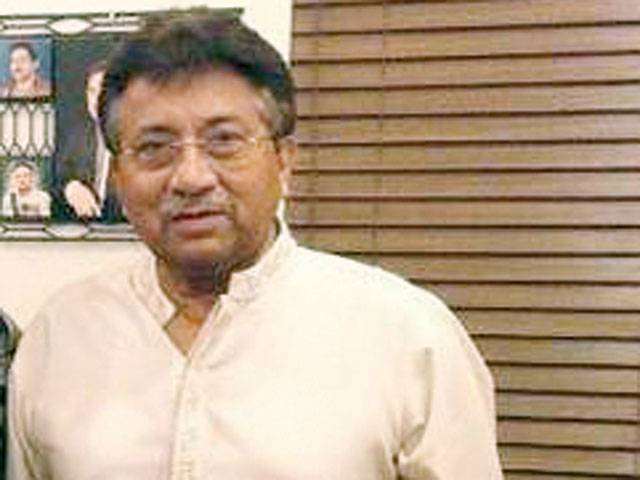ISLAMABAD - Every time General (r) Pervez Musharraf is summoned by a court the security agencies discover explosive material near his farmhouse residence, where he had been detained since April 2013.
The former military dictator, who on Sunday claimed that country’s army was behind him on the issue of his treason trial, has been summoned today by a Special Court – constituted by the federal government for his trial under Article 6 for condemning and suspending the constitution.
Just a day before his appearance before the Special Court for framing of charges in the high treason case, five bags of explosives have been found from outside his residence. The same thing happened earlier when he was summoned by the Special Court.
Musharraf’s lawyers have been seeking expectation from his personal appearance and claims of explosives being found were also made at different times previously when he was called by Anti-Terrorist Court, the Balochistan High Court and Islamabad High Court.
The legal experts termed it a ploy to linger on the case. Ahsanud Din Sheikh, one of lawyers who filed high treason petition against Musharraf in the Supreme Court, said: “Intentionally the efforts were being made to delay the trial proceedings and it seemed the federal government was also involved in it.”
Talking to The Nation, he said in order to influence the high treason trial and the judges conducting proceeding, the former dictator had given interviews to the TV channels, and giving implicit and explicit claims that whole army was behind him. He said the Pemra should have taken notice of it.
No comments have come from the army on his assertions, but Pakistan Ex-Servicemen Society (PESS) and Pakistan Ex-Servicemen Association (PESA) rejected retired general’s claim that the army men were upset with the treason allegations against their former boss and that the army was fully supporting him on this issue.
In a joint statement issued on Monday, PESS President Lt-Gen (r) Hamid Gul, and PESA President Lt-Gen (r) Ali Kuli Khan said: “Army has nothing to do with the declaration of emergency by him (ex-president)... Musharraf seems to be trying to implicate the Army as abettor of the alleged offence, which was violation of Article 6 of the constitution.” They said they consider that the proclamation of emergency on Nov3, 2007 and sacking of judges were Musharraf’s personal acts.
Ahmed Raza Kasuri’s opinion was that the court and the government were in the knowledge that Musharraf’s life was in danger and he has been constantly receiving threats. He said: “The court (Special Court) and the federal government would be directly responsible if anything happens to former president” because they (judges) are summoning him despite knowing it well that his life is under threat. However, He Kasuri did admit that the Special Court could hold trial at his farm, as charges could not be framed against him without his presence.
In the past when Anti-Terrorist Court had summoned Musharraf, the Islamabad Capital Territory administration had shown its inability for making arrangements for his safe journey from his farm to the court premises. Similarly, Balochistan High Court also summoned Musharraf but when the security authorities expressed their reluctance, the judges did not press for his production.
Anwar Mansoor, leading counsel of Musharraf, in the last hearing had told the Special Court: “His client is unable to attend the court today and he cannot appear in future unless the federal government provide adequate security to him.” The court had granted one time exemption to the former dictator, with the direction to the federal government “to ensure that necessary security arrangements are made for the safe journey of the accused from his residence to this court for next date.”
Ikram Chaudhry, constitutional prosecutor in the case, stated that if there were some genuine grounds for non-appearance of the accused then the court have authority to waive the appearance. But he said in this case, it seemed that some forces wanted inordinate delay to frustrate the trial. He hoped the Special Court would not grant more exemption as it had already given one.
Friday, April 19, 2024
Musharraf’s farm goes ‘explosive’ again
Security agencies ‘discover’ 5-kg explosives a day before his appearance in court

9:26 AM | April 19, 2024
No damage to Iranian nuclear sites after Israeli airstrikes, says UN nuclear watchdog
12:50 PM | April 19, 2024
Ch Shafay visits Directorate of Consumer Protection Council
April 19, 2024
ECP reviews arrangements for by-elections in Punjab
April 19, 2024
Punjab’s price control initiative: A welcome step
12:33 PM | April 19, 2024
A Tense Neighbourhood
April 19, 2024
Dubai Underwater
April 19, 2024
X Debate Continues
April 19, 2024
Hepatitis Challenge
April 18, 2024
IMF Predictions
April 18, 2024
Kite tragedy
April 19, 2024
Discipline dilemma
April 19, 2024
Urgent plea
April 19, 2024
Justice denied
April 18, 2024
AI dilemmas unveiled
April 18, 2024
ePaper - Nawaiwaqt
Advertisement
Nawaiwaqt Group | Copyright © 2024





